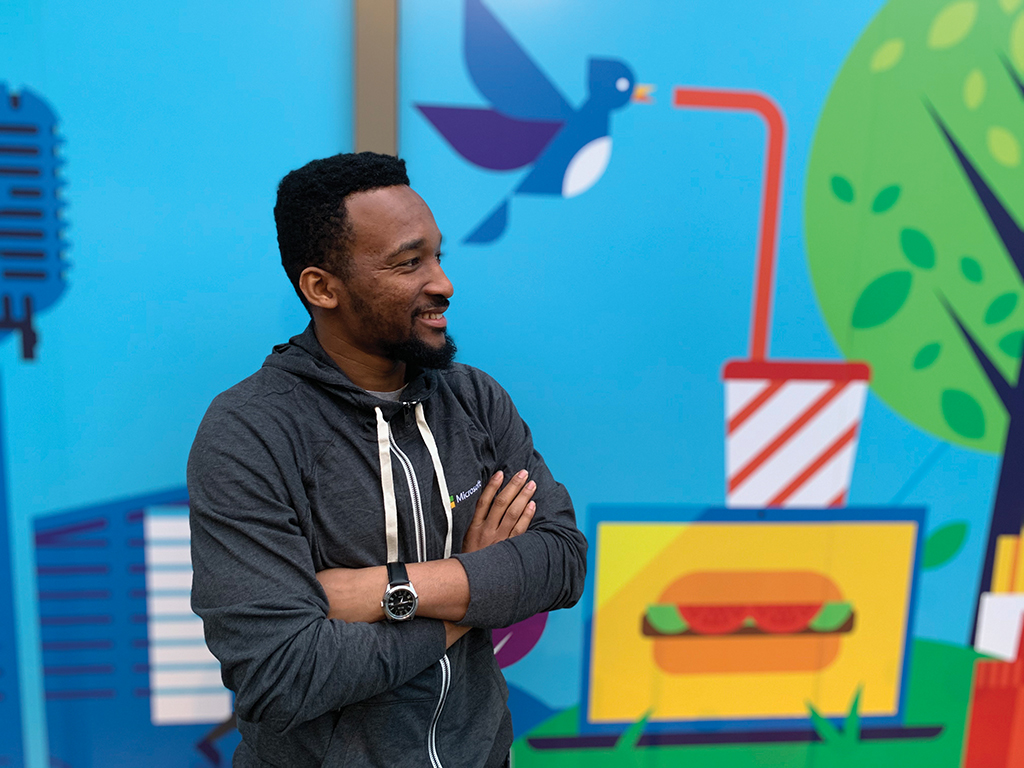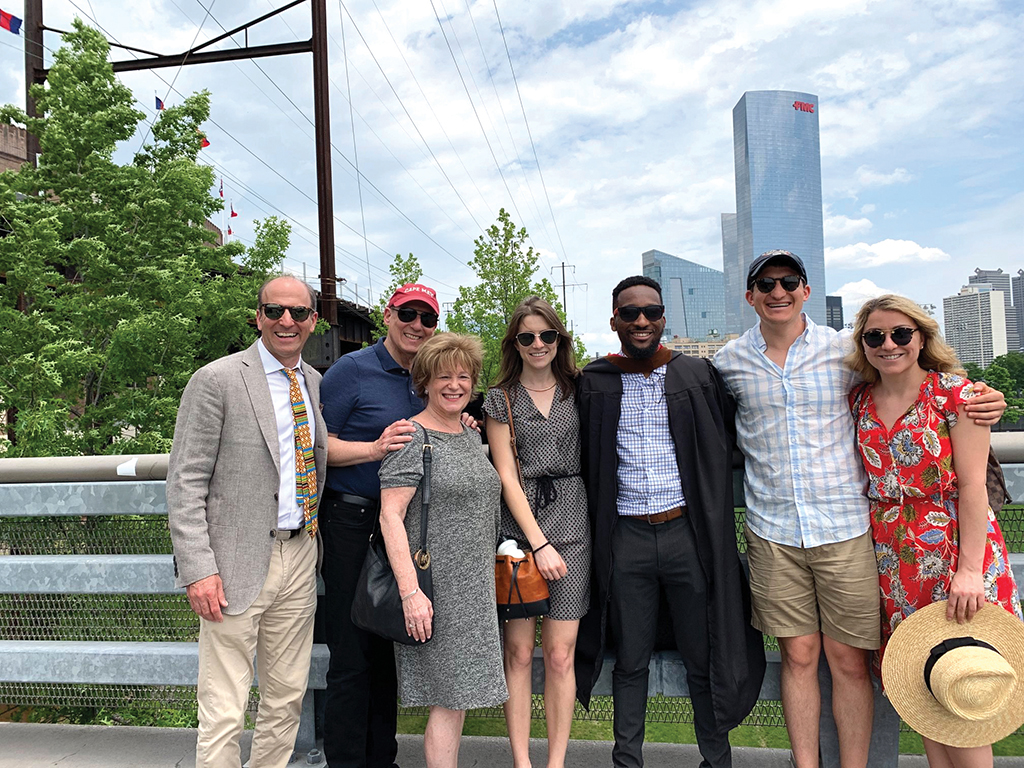Chance, happenstance, faith and love mark one alumnus’ journey from Ghana to Berea
At 1 a.m. in Elmina, Ghana, after a long day of selling water on the roadside to pedestrians and motorists, hawking bracelets at Elmina Castle to tourists and attending soccer practice, Anthony Ayebiahwe ’16 would sit studying by the light of a neighbor’s home. When the day’s light had faded from his home with no electricity, he carried his desk outside so he could continue his studies. On rainy days, Ayebiahwe postponed his studies. Otherwise, passersby grew accustomed to seeing him night after night and offered words of encouragement.
This was Ayebiahwe’s routine from elementary through high school. His father was a fisherman and his mother cooked and sold food on the roadside to taxi drivers. His family struggled to provide for their basic needs.
“We couldn’t make more than $10 in a given day,” Ayebiahwe said. “It was very tough growing up in that environment.”
In a community where only 2 to 3 percent of the population attends high school, Ayebiahwe was fortunate to obtain scholarships to pay for his early education. As he neared the end of high school, he knew he wanted to attend a university, but he had no way to pay for such endeavors.

Despite the stress of financial hardship, Ayebiahwe continued playing soccer. His coach had befriended a 19-year-old student named Phillip Levine who was studying abroad in Ghana. One day after practice, Ayebiahwe saw Levine walking toward him. The two had never met. Tired from practice, Ayebiahwe intended to walk by. But something told him to stop and say, “Hi.”
“If I had just passed Phillip, I think I would still be in Ghana, probably fishing right now,” Ayebiawhe said. “But, instead, that was the breakthrough moment.”
As they talked, Levine said he was from the United States, and Ayebiahwe asked, “True or false, people in your country can go to college for free?” Levine explained how students with good grades could get scholarships, and Ayebiahwe described his family situation and spoke of his goals to attend college. The two walked the 30-minute route back to Ayebiahwe’s house. Inside, Ayebiahwe lit candles in his dark home, and his mother, who spoke no English, asked him to ask Levine if he wanted any of the food she was preparing. Levine accepted the offer and took in his surroundings. Immersed in Ayebiahwe’s situation and ambitions, Levine told them he would register Ayebiahwe for the SAT and help him begin the process of going to college.
“I told him to forget it,” Ayebiahwe recalled. “I said, ‘You are a young person. How are you going to register me for the SAT?’ I thought if he helped then he helped. But if not, I’d continue to survive here in Ghana. But this guy was true to his word.”
That began a friendship and Ayebiahwe’s journey to obtaining higher education. Being registered for the SAT was only part of the battle. He had no access to books nor the internet at home to prepare for the exam. The SAT center was three hours away, in Accra, and he would need transportation there as well as identification, such as a passport, once he arrived to take the exam.
I thought if he helped then he helped. But if not, I’d continue to survive here in Ghana. But this guy was true to his word.
Anthony Ayebiahwe ‘16
“I didn’t have money to do that—there was no money even for food,” Ayebiahwe said. “It was getting difficult. There was nothing at home and…no way for me to get money.”
So, Levine, now back in the U.S., set up a Go Fund Me campaign to pay for these expenses. He helped research and recommend colleges for Ayebiahwe to send his SAT scores and assisted him with application fees. Levine told him about Berea College, with which Ayebiahwe was familiar because many students from Ghana applied each year, he said. He submitted his application packet as Berea’s deadline drew near—and he waited.
On May 6, 2012, Ayebiahwe went to an internet café in Elmina to chat with Levine, and he saw an email from Berea College. It was sooner than expected and he assumed it was his rejection letter, he recalled.

“I used one eye, literally, to look at the email,” he said. “I looked at it halfway. But when I opened it and the first phrase was, ‘We are happy…,’ I didn’t even finish reading. I stopped everything I was doing and started running on the streets shouting.
“It was a very joyous and grateful moment,” Ayebiahwe continued. “Here was my break. I couldn’t go to university in my home country because my parents didn’t have the money, so to get this opportunity to come to Berea was a miracle.”
Levine once again helped raise money for Ayebiahwe’s visa and flight to the U.S. And in August 2012, he and his father picked Ayebiahwe up at the airport in St. Louis and drove him to Berea’s campus.
At Berea, Ayebiahwe planned to pursue a pre-medical track. But through the influence of Economics and Business department professors including Dr. Volker Grzimek and Dr. Jean Cupidon, he instead majored in economics. He was a Bonner Scholar, participated in the Entrepreneurship for the Public Good program and was selected as a University Innovation Fellow, a program that empowers students to become leaders of change in higher education. Ayebiahwe also had the opportunity to intern at Southwest Airlines in Dallas. And along with all of this, he played soccer for the College and was part of the leadership team for the African Student Association.
It was a very joyous and grateful moment. Here was my break. I couldn’t go to university in my home country because my parents didn’t have the money, so to get this opportunity to come to Berea was a miracle.
Anthony Ayebiahwe ‘16
After graduating in 2016, Ayebiahwe attended the University of Pennsylvania and earned a master’s degree in analytics.
Today, Ayebiahwe is an engineering program manager at Microsoft in Washington, and he and Levine are again partnering to change the lives of young Ghanaian scholars. In May, the two launched Two Brothers Fellows with the mission of helping top-performing Ghanaian students coming from extraordinary financial circumstances achieve higher education.
“I believe strongly in giving back,” Ayebiahwe said. “There are many people in Ghana who are very good students but don’t have anyone to push them. If they don’t have anyone to push them, after high school they will just sit at home and do something they didn’t want to do. So, our idea was to have these high school seniors or those who have just graduated be able to get a higher education free of charge.”
Partnering with the education system in Ghana and a team to help screen potential fellows for the program, Ayebiahwe and Levine are seeking Ghana’s most promising and financially disadvantaged young people and offering the same opportunities Levine helped Ayebiahwe secure. Two Brothers Fellows began receiving applications this summer. After screening these applicants, they will select 10 finalists to take the SAT free of charge and connect them to an academic tutor and training materials. From these finalists, two students with the strongest applications will be chosen to receive full financial support to pursue higher education in the United States, visa application fees, airfare when they are accepted and grants to help support other college expenses. In addition, two runners up will receive scholarships to study in universities across Ghana to continue their education.
A friendship that started as a chance meeting on an Elmina roadside nearly a decade ago changed the course of Ayebiahwe’s life. Today, Levine’s unrivaled kindness coupled with Ayebiahwe’s service experiences as a Bonner Scholar and empowerment mindset fostered by the University Innovation Fellows program are enabling these two friends to set a new course for Ghana’s best and brightest.


Hope does happen. Such an inspiring story of a life well lived.
What a beautiful and hopeful story … Adam enjoys reading it. When there is interest, a person can do anything. Now, in any field, life is a lesson. In my opinion, having interest and hope is one of the duties of everything. It taught me to find my own career path and I worked hard to find my career path. I may have been tired and frustrated for a long time, but I did not give up until I finally reached the path I loved, and that was programming.
Wow, amazing. Am also from Ghana and is my dream to enter berea, currently in high school, am studying extra hard and praying to get there one day…this story has inspired me alot